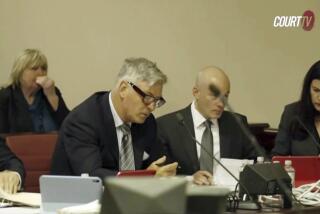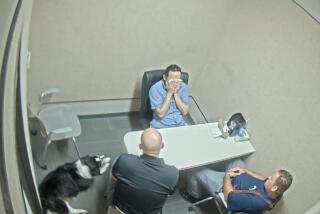Pretrial News Colors Selection of Peyer Jury
- Share via
The effect of pretrial publicity in the murder trial of former California Highway Patrol Officer Craig Peyer overshadowed the start of jury selection Monday, when each of the first 10 prospective jurors expressed sometimes-detailed knowledge of the case.
Six of them said they thought Peyer is guilty or probably guilty of killing Cara Knott.
“You could have hardly lived in the county last year and not be exposed (to publicity about the case),” prospective juror Robert L. Harrell said.
Peyer, 37, is charged with killing Knott, who was a San Diego State University student, on Dec. 27, 1986, and is free on $1-million bail. According to police, Knott, 20, was strangled between 9 and 10 p.m. after Peyer, in uniform and in his patrol car, stopped her. She was killed after a struggle on a bridge near Interstate 15 and Mercy Road. Her body was thrown 65 feet down into a dry creek bed.
Six Passed First Phase
Harrell, one of three juror candidates who said they had no opinion on Peyer’s guilt or innocence, was among six prospective jurors who survived the first phase of jury selection. That process is to determine the extent that the initial pool of 130 people has been tainted by publicity in the sensational case. The remaining three said that Peyer was guilty or probably guilty.
Those who are asked to return will be questioned further next week by attorneys for both sides and by Superior Court Judge Richard D. Huffman before a jury of 12 is selected.
Three prospective jurors--Lawrence G. Endris, Richard J. Foster and Judith Frazier--were chosen despite expressing opinions that Peyer is guilty or probably guilty. Jurors were brought into the courtroom one at a time to be interviewed by Huffman, defense attorney Robert Grimes and Deputy Dist. Atty. Joseph Van Orshoven.
“I kind of feel that he might be (guilty),” Foster said in response to a question by Huffman. “. . . I usually feel when someone’s arrested there’s some reason for it.”
Frazier was typical of the jurors who said they based their opinions about Peyer’s guilt or probable guilt on newspaper stories and television and radio reports of the killing.
“I think there’s a good chance he will be convicted on evidence as shown in the newspaper,” Frazier said.
The judge denied Grimes’ requests to dismiss Foster and Frazier.
Huffman and the attorneys took pains to explain to the prospective jurors that Peyer should be tried solely on evidence and testimony presented at the trial, and not on the basis of press reports. Those who were picked as possible jurors said they could put their prejudices aside and try Peyer only on evidence presented in the courtroom.
At the end of Monday’s hearing, Grimes said he was amazed by everyone’s knowledge of the case.
“One thing that has been interesting so far is that there hasn’t been a prospective juror that has not heard about the case. Folks are being pretty open and candid with us. . . . We’ll just have to take it day by day and evaluate if we can find 12 people to try the case,” Grimes said.
Indeed, most in the first batch of potential jurors said they were familiar with some of the most damaging facts in the case. These include allegations that a drop of blood that matches Peyer’s blood type was found on Knott’s boot, and a microscopic piece of thread taken from the woman’s bloodstained sweat shirt matched thread samples taken from Peyer’s CHP jacket shoulder patches. One juror said she had heard that a piece of Knott’s hair was also lifted from Peyer’s jacket.
All of the jurors said they had heard or read reports about Peyer stopping 18 young women for minor traffic violations at the same isolated off-ramp where Knott was killed. One of the women was detained for as long as one hour and 40 minutes.
In November, Peyer’s attorneys released results from a poll that purportedly showed that 95% of 400 people interviewed in the county knew about the case and that 63% believed that Peyer was guilty. The poll was introduced as evidence in an unsuccessful attempt by Peyer’s attorneys to move the trial out of the county.
Huffman denied Grimes’ initial motion to move the case to another jurisdiction, but the possibility still remains that Peyer may not be tried in San Diego County. The judge said he would allow Grimes another opportunity to file for a change of venue during jury selection.
On Monday, Grimes said it is too early in the process to decide whether to file a new request to move the trial. In addition to the change of venue, Grimes said another option he is considering is whether to bring jurors from outside the county to hear the case.
Monday’s hearing had an ominous beginning.
Steven M. Bell, the first juror questioned, was excused when he said that on the day of the murder he was working with a construction crew near the Mercy Road off-ramp where Knott was killed and the next day, when her body was recovered.
In addition, Bell surprised the attorneys when he said that his job superintendent had told him that he had seen a police car in the area where Knott was killed before the incident. He was not precise about when his boss saw the car. A young woman who testified at Peyer’s preliminary hearing said she saw a police cruiser leave the murder scene about the time that police said Knott was killed.
Bell, who said he has a sister who is about the age Knott was at the time of her death, said he is convinced that Peyer is guilty.
“It’s very difficult for me to believe that Mr. Peyer is innocent,” Bell said in response to a question from Huffman. Jury selection will continue today. Attorneys plan to question 20 jurors a day until all 130 possible jurors are interviewed. Those who are not excused will be questioned further in a general examination, which is tentatively scheduled to begin Jan. 14.
More to Read
Sign up for Essential California
The most important California stories and recommendations in your inbox every morning.
You may occasionally receive promotional content from the Los Angeles Times.













